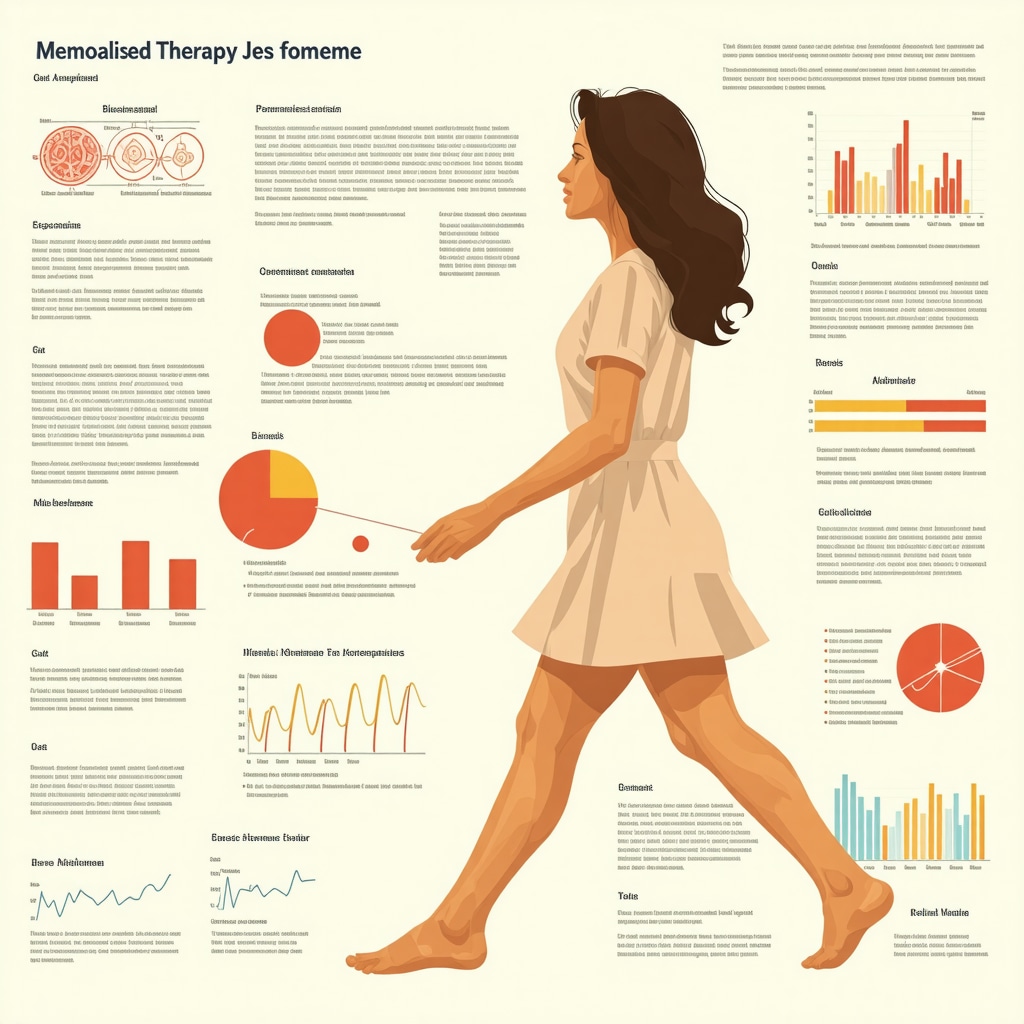Harnessing Bioidentical Hormone Replacement Therapy for Menopause: A San Diego Perspective
Natural menopause treatment has evolved beyond symptom palliation to encompass a multifaceted approach that integrates Bioidentical Hormone Replacement Therapy (BHRT) with comprehensive wellness strategies. In San Diego, where health-conscious communities prioritize personalized medicine, combining BHRT with lifestyle modifications offers a sophisticated pathway to restoring hormonal harmony and enhancing quality of life during menopause.
Synergistic Benefits of BHRT and Holistic Wellness Interventions
BHRT utilizes hormones chemically identical to endogenous human hormones, allowing for precise physiologic replacement tailored to individual hormonal profiles. This specificity reduces risks associated with traditional hormone therapies, as evidenced by contemporary research such as the Journal of Women’s Health. When coupled with wellness practices—nutritional optimization, stress management, and targeted physical activity—BHRT potentiates symptom relief including vasomotor instability, mood fluctuations, and cognitive fog.
How Does Combining BHRT with Wellness Enhance Long-Term Menopausal Health Outcomes?
The integration of BHRT with natural hormone balancing techniques in San Diego addresses not only the biochemical milieu but also psychosocial factors influencing menopausal transitions. Customized nutritional plans rich in phytoestrogens and anti-inflammatory foods, alongside mindfulness-based stress reduction, amplify the endocrine modulation effects of BHRT. This holistic synergy mitigates risks of osteoporosis, cardiovascular disease, and metabolic dysregulation, common sequelae of menopause.
Addressing Common Concerns: Safety, Efficacy, and Personalized Protocols
San Diego practitioners emphasize thorough hormonal profiling and continuous monitoring to optimize BHRT dosing and minimize side effects. Individualized treatment regimens are essential—especially considering variable absorption rates and metabolic differences among patients. Moreover, integrating natural hormone optimization strategies, including San Diego’s top natural hormone balancing tips, ensures a comprehensive approach that respects each woman’s unique physiological context.
Implications for Clinical Practice: Multidisciplinary Collaboration in San Diego
Implementing combined BHRT and wellness approaches requires collaboration among endocrinologists, naturopathic doctors, nutritionists, and mental health professionals in San Diego. This multidisciplinary framework enables nuanced assessment and dynamic adjustments to therapy, reflecting cutting-edge standards in menopause care. For example, hormone pellet therapy—a popular BHRT modality in San Diego—demands expert procedural skills alongside integrative lifestyle counseling to maximize therapeutic outcomes (learn more about hormone pellet therapy).
Exploring Further: Where Can San Diego Women Access Expert Menopause Care?
For those seeking advanced, natural menopause treatment in San Diego, exploring specialized clinics that offer combined BHRT and wellness plans is critical. Engaging with providers who emphasize personalized hormone optimization and holistic health can transform menopausal experiences. Interested readers are encouraged to contact expert hormone therapists in San Diego to discuss tailored treatment strategies and contribute their insights to evolving best practices.
Innovations in Hormone Pellet Therapy: Precision and Patient-Centered Approaches
Hormone pellet therapy has gained traction in San Diego for its ability to provide steady hormone delivery and enhanced compliance compared to traditional BHRT methods. Recent advancements focus on tailoring pellet composition and dosing schedules based on comprehensive metabolic and hormonal profiling, ensuring that hormone levels mimic natural circadian rhythms and physiological needs. This precision medicine approach reduces fluctuations that often cause side effects and suboptimal symptom control, elevating patient satisfaction and long-term adherence.
Clinicians in San Diego are increasingly integrating digital health tools to monitor hormone levels remotely, facilitating dynamic adjustments to therapy without frequent office visits. Such innovations reflect a broader trend toward personalized, minimally invasive hormone optimization strategies that align with the lifestyle preferences of active San Diego populations.
Integrating Nutrigenomics with BHRT: A Frontier for Customized Menopause Management
Nutrigenomics—the study of gene-nutrient interactions—offers promising avenues to refine menopause care by identifying individual genetic variants that influence hormone metabolism, receptor sensitivity, and nutritional requirements. When combined with BHRT, nutrigenomic insights enable practitioners to prescribe nutrition plans and supplements that synergize with hormone therapy, optimizing outcomes.
For example, polymorphisms in estrogen receptor genes may dictate responsiveness to bioidentical estradiol, while variants affecting cytochrome P450 enzymes influence hormone clearance rates. Tailoring BHRT in accordance with these genetic markers can mitigate side effects and enhance efficacy, representing a cutting-edge paradigm in San Diego’s natural hormone optimization landscape.
What Role Does Stress Resilience Play in Enhancing BHRT Outcomes for Menopausal Women?
Stress profoundly impacts hypothalamic-pituitary-adrenal (HPA) axis function and, consequently, hormonal balance. San Diego experts recognize that resilience-building interventions—such as mindfulness meditation, cognitive-behavioral therapy, and adaptogenic herbal support—complement BHRT by stabilizing cortisol levels and reducing systemic inflammation. These effects potentiate the therapeutic benefits of bioidentical hormones, particularly in mitigating mood disturbances and cognitive decline during menopause.
Integrative protocols that prioritize psychological well-being alongside biochemical correction exemplify the sophisticated, patient-centric approaches emerging in San Diego’s hormone therapy clinics (source: National Institutes of Health).
Bridging Clinical Evidence and Patient Education: Empowering San Diego Women
Effective menopause care hinges on transparent communication and education about BHRT benefits, risks, and lifestyle synergy. San Diego providers emphasize informed consent and shared decision-making, ensuring that patients are active participants in their treatment journey. Educational initiatives cover topics such as distinguishing bioidentical hormones from synthetic counterparts, understanding therapy timelines, and integrating natural hormone balancing strategies (explore San Diego’s natural hormone balancing tips).
Engaging with peer support networks and digital resources further enhances adherence and satisfaction, underscoring the importance of a holistic framework that extends beyond clinical intervention.
Exploring Collaborative Care Models: The Future of Menopause Treatment in San Diego
Multi-disciplinary collaboration among endocrinologists, naturopathic doctors, nutritionists, and mental health professionals is pivotal to refining BHRT protocols and integrating wellness therapies. San Diego clinics are pioneering models that facilitate seamless communication and coordinated care plans, optimizing outcomes for diverse menopausal populations.
This integrated model addresses complex symptomatology and comorbidities, offering personalized, evidence-based solutions that respect individual preferences and cultural contexts. For those interested in experiencing this comprehensive approach, contact leading San Diego hormone therapy specialists to begin your tailored journey toward hormonal balance and well-being.
Decoding the Complex Interplay of Genetics and Hormone Therapy: Precision Medicine in Menopause Management
Understanding the genetic underpinnings that influence hormone metabolism and receptor activity is revolutionizing menopause care. In San Diego, clinics are increasingly leveraging precision medicine approaches to tailor Bioidentical Hormone Replacement Therapy (BHRT) based not only on symptomatic profiles but also on individual genetic polymorphisms. This paradigm shift enables highly personalized treatment plans that optimize efficacy while minimizing adverse effects.
For instance, variants in the CYP1A1 and CYP3A4 genes, which encode enzymes critical for estrogen metabolism, can significantly alter hormone bioavailability and clearance rates. Recognizing these polymorphisms allows clinicians to adjust BHRT dosing and select appropriate hormone formulations, striking a balance between symptom relief and safety. Moreover, polymorphisms in estrogen receptor alpha (ESR1) and beta (ESR2) genes can modulate tissue-specific hormone responsiveness, further informing therapeutic choices.
How Does Genetic Testing Enhance the Customization of BHRT Protocols in San Diego?
Genetic testing provides a roadmap to understanding individual variability in hormone processing, receptor sensitivity, and risk profiles. By integrating these insights, San Diego practitioners can predict treatment responsiveness, anticipate potential side effects, and tailor adjunctive nutritional and lifestyle interventions. This approach transcends the traditional trial-and-error model, fostering a more targeted and efficient path to hormonal equilibrium.
Beyond pharmacogenomics, nutrigenomic data guide personalized dietary recommendations that complement BHRT. For example, individuals with specific polymorphisms affecting folate metabolism might benefit from enhanced methylation support to optimize estrogen detoxification pathways. This integrative strategy is supported by research published in the Journal of Personalized Medicine, underscoring the clinical relevance of genomics-informed hormone therapy.
Leveraging Digital Health Technologies: Remote Monitoring and Adaptive BHRT Optimization
San Diego’s progressive hormone therapy centers are at the forefront of incorporating digital health tools to refine BHRT management. Wearable biosensors and mobile health applications facilitate real-time monitoring of physiological parameters such as basal body temperature, heart rate variability, and sleep quality — all proxies for hormonal fluctuations.
These technologies enable clinicians to perform dynamic adjustments to hormone dosing remotely, reducing the need for frequent in-person visits and enhancing patient convenience. Additionally, integrating symptom tracking applications with hormonal assays allows for a data-driven approach to therapy optimization, fostering a responsive and individualized treatment experience.
Emerging platforms utilize machine learning algorithms to analyze complex datasets, predicting symptom trajectories and recommending proactive modifications to BHRT regimens. Such innovations exemplify how digital transformation is elevating hormone replacement therapy from a static intervention to an adaptive, precision-based therapy aligning with patients’ lifestyles and clinical needs.
Integrative Approaches to Mitigate BHRT Risks: A Focus on Cardiovascular and Bone Health
While BHRT offers significant symptom relief, mitigating associated risks remains paramount. San Diego clinicians emphasize integrative strategies that synergize hormone therapy with targeted lifestyle interventions to preserve cardiovascular integrity and skeletal robustness.
For cardiovascular health, combining BHRT with anti-inflammatory nutrition—rich in omega-3 fatty acids, antioxidants, and low glycemic index carbohydrates—helps attenuate endothelial dysfunction and systemic inflammation often exacerbated during menopause. Regular supervised exercise, particularly weight-bearing and aerobic activities, complements hormonal modulation by improving lipid profiles and vascular compliance.
Bone health optimization involves BHRT-supported maintenance of estrogen levels, critical for bone remodeling balance, alongside adequate intake of calcium, vitamin D, and magnesium. Advanced imaging techniques, such as DXA scans and trabecular bone score assessments, guide personalized interventions to prevent osteopenia and osteoporosis.
What Evidence Supports the Safety Profile of BHRT When Integrated with Lifestyle Modifications?
Clinical studies, including longitudinal cohorts analyzed in the American Heart Association’s Circulation journal, affirm that BHRT, when judiciously prescribed and combined with lifestyle measures, does not significantly increase cardiovascular risks. Instead, it may confer protective effects by improving metabolic parameters and vascular function. This underscores the importance of a comprehensive approach that extends beyond hormone replacement alone.
Enhancing Patient Empowerment Through Education and Collaborative Decision-Making
Effective menopause management transcends clinical protocols to encompass patient education and empowerment. San Diego providers prioritize transparent communication, leveraging multimedia educational tools and decision aids to elucidate the nuances of BHRT, genetic testing, and integrative wellness strategies.
Patients are encouraged to actively participate in their therapy design, fostering adherence and satisfaction. Peer support groups and telehealth platforms enhance community engagement and continuous learning, addressing psychosocial dimensions of menopause.
For practitioners and patients eager to explore these advanced, integrative menopause care models, connecting with San Diego’s specialized hormone therapy centers can provide access to cutting-edge diagnostics and tailored treatment options.
As the field advances, ongoing research and clinical innovation continue to refine these personalized approaches, promising even greater efficacy and safety in managing menopausal transitions.

Unveiling Epigenetic Modulators: The Next Frontier in Hormonal Balance
Beyond genetic polymorphisms, epigenetic modifications such as DNA methylation and histone acetylation emerge as pivotal regulators of hormone receptor expression and function during menopause. In San Diego’s progressive clinical settings, epigenetic profiling is beginning to inform BHRT personalization by identifying reversible gene expression patterns influenced by environmental factors and lifestyle. This innovative approach enables clinicians to tailor interventions not only to the patient’s fixed genetic code but also to their dynamic epigenomic landscape, optimizing hormone responsiveness and mitigating menopausal symptomatology.
Leveraging Circadian Biology to Optimize Hormone Pellet Timing and Dosage
Recent studies emphasize the integration of chronotherapy principles in BHRT, aligning hormone delivery with endogenous circadian rhythms to enhance therapeutic efficacy and reduce adverse effects. San Diego experts are pioneering protocols that modulate hormone pellet insertion timing and composition based on individual circadian markers such as melatonin secretion and cortisol awakening response. This temporal precision fosters improved sleep quality, mood stabilization, and metabolic regulation, thereby amplifying the holistic benefits of bioidentical hormone optimization.
How Can Advanced Biomarkers Refine the Monitoring and Adjustment of BHRT in Real-Time?
Cutting-edge biomarker panels incorporating salivary, serum, and urinary assays enable comprehensive monitoring of hormone metabolites, inflammatory cytokines, and oxidative stress indicators. San Diego clinicians utilize these dynamic biomarkers to fine-tune BHRT dosing beyond static serum hormone levels, capturing nuanced physiological feedback loops. For instance, tracking ratios of estrone to estradiol metabolites provides insights into estrogen metabolism pathways that influence efficacy and safety. This biomarker-driven strategy enhances personalized care and anticipates potential complications before clinical manifestation.
Authoritative insights into biomarker utilization in hormone therapy can be found in the Journal of Clinical Endocrinology & Metabolism, which delineates the clinical utility of multi-analyte panels in endocrine modulation.
Integrating Gut Microbiome Modulation with BHRT for Enhanced Hormonal Metabolism
The gut microbiota’s role in estrogen metabolism—termed the estrobolome—is gaining recognition as a critical factor influencing BHRT outcomes. San Diego specialists are incorporating prebiotic and probiotic interventions alongside BHRT to promote favorable microbial populations that enhance enterohepatic recycling of estrogens, thereby optimizing hormone bioavailability and reducing metabolite-related side effects.
Targeted dietary strategies and microbiome analyses facilitate bespoke interventions that complement hormonal therapies, reflecting a systems biology approach to menopause management.
Empowering Patients Through Advanced Digital Platforms: AI-Driven Decision Support and Education
San Diego’s hormone therapy clinics are integrating artificial intelligence-powered platforms that analyze patient-reported outcomes, genetic data, and biomarker profiles to support shared decision-making. These digital tools provide personalized education, predictive analytics, and therapy adjustment recommendations, fostering patient autonomy and improving adherence.
By harnessing AI, clinicians can dynamically adapt BHRT regimens in response to evolving patient needs and scientific evidence, embodying precision medicine’s promise in menopause care.
Exploring the Intersection of BHRT and Immunomodulation: Implications for Autoimmune Conditions in Menopause
Emerging research suggests that bioidentical hormones influence immune system function, with potential therapeutic implications for autoimmune diseases that often manifest or exacerbate during menopause. San Diego integrative practitioners are investigating how BHRT protocols can be optimized to modulate immune responses, reduce chronic inflammation, and improve quality of life for patients with concurrent autoimmune conditions.
What Strategies Are Available to Safely Integrate BHRT in Women with Autoimmune Disorders?
Comprehensive assessment including immunologic biomarkers guides the safe initiation and monitoring of BHRT in this population. Adjunctive therapies such as low-dose naltrexone, vitamin D optimization, and anti-inflammatory nutrition support the immune-hormonal axis. Collaborative care involving endocrinologists, immunologists, and naturopathic doctors ensures balanced and vigilant management.
Further evidence is detailed in the Frontiers in Immunology journal, highlighting the bidirectional relationship between hormones and immune regulation.
Invitation to Engage: Elevate Your Menopause Care with Integrative BHRT Expertise
For San Diego women seeking to transcend conventional menopause treatments, embracing these advanced, integrative strategies offers a transformative path toward hormonal balance and holistic vitality. Connect with specialized hormone therapy clinics that blend genomics, chronobiology, microbiome science, and digital innovations to craft personalized BHRT protocols tailored to your unique physiology and lifestyle. Contact our expert team today to embark on an elevated, evidence-based journey through menopause with confidence and clarity.

Expert Insights & Advanced Considerations
Integrating Chronobiology Enhances Hormone Pellet Therapy Outcomes
Aligning bioidentical hormone delivery with individual circadian rhythms represents a progressive refinement in BHRT protocols. San Diego clinicians leverage timing strategies based on melatonin and cortisol cycles to optimize hormone pellet insertion schedules, thereby improving sleep quality, mood stability, and metabolic regulation. This temporal precision reduces adverse effects and elevates patient satisfaction.
Epigenetic Profiling Offers Dynamic Personalization Beyond Genetic Testing
While genetic polymorphisms inform baseline BHRT customization, emerging epigenetic markers provide a responsive layer of personalization by reflecting environmental and lifestyle influences on hormone receptor expression. Utilizing DNA methylation and histone acetylation data allows San Diego practitioners to tailor therapies that adapt over time, enhancing hormone responsiveness and mitigating menopausal symptoms effectively.
Gut Microbiome Modulation as a Crucial Adjunct in Hormonal Optimization
The estrobolome’s role in estrogen metabolism underscores the need for integrated microbiome-targeted interventions alongside BHRT. San Diego experts incorporate prebiotic and probiotic regimens to promote favorable microbial populations that enhance enterohepatic estrogen recycling, improving hormone bioavailability and minimizing metabolite-related side effects.
Digital Health Tools Enable Real-Time, Data-Driven BHRT Adjustments
Wearable biosensors and AI-powered platforms empower clinicians and patients with continuous monitoring of physiological proxies related to hormone status. This facilitates dynamic, individualized hormone dosing adjustments remotely, reducing clinical visits and improving adherence. San Diego’s hormone therapy centers are pioneering these innovations to elevate personalized menopause care.
Collaborative Multidisciplinary Care Models Enhance Safety and Efficacy
Integrating endocrinologists, naturopathic doctors, nutritionists, and mental health professionals fosters comprehensive assessment and management of complex menopausal presentations. Such collaboration in San Diego ensures that BHRT protocols are harmonized with lifestyle, genetic, immunologic, and psychosocial factors, optimizing outcomes and minimizing risks.
Curated Expert Resources
- Journal of Women’s Health: Provides peer-reviewed studies on BHRT efficacy and safety, essential for understanding contemporary hormone replacement paradigms.
- Journal of Clinical Endocrinology & Metabolism: Offers in-depth analyses on biomarker utilization and endocrine modulation critical for advanced BHRT monitoring.
- Frontiers in Immunology: Explores the interplay between hormones and immune function, informing safe BHRT integration in autoimmune conditions.
- American Heart Association’s Circulation Journal: Presents longitudinal data on cardiovascular outcomes linked to hormone therapies, supporting integrative risk mitigation strategies.
- Journal of Personalized Medicine: Highlights nutrigenomics and pharmacogenomics research pivotal for tailoring menopause care at the molecular level.
Final Expert Perspective
Natural menopause treatment through Bioidentical Hormone Replacement Therapy in San Diego has transcended conventional symptom management by embracing precision medicine, integrative biology, and digital innovation. The convergence of genetic and epigenetic insights, circadian-aligned hormone delivery, microbiome modulation, and collaborative multidisciplinary care constitutes a sophisticated framework that addresses the complex hormonal, metabolic, and psychosocial dimensions of menopause. This nuanced approach not only optimizes therapeutic efficacy and safety but also empowers women to actively engage in their health journeys.
For those seeking to elevate their menopausal care, connecting with San Diego’s specialized hormone therapy centers offers access to these cutting-edge modalities. Engage with expert practitioners to personalize your BHRT strategy, integrate holistic support, and navigate menopause with confidence and clarity. Explore more about how natural menopause treatment in San Diego can transform your health experience today.

